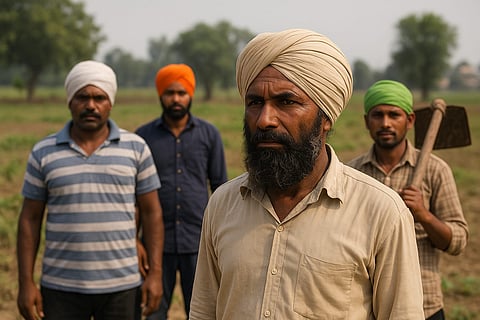

On September 9, a five-year-old boy was abducted and killed in New Deep Nagar, Hoshiarpur, in a crime that horrified Punjab. Police allege the boy was sexually assaulted and murdered by Manke Yadav, a migrant worker from Uttar Pradesh. Arrested the same night with the help of CCTV footage, Yadav now faces trial for one of the most disturbing cases in recent memory.
But the crime’s aftershocks have spread beyond the courtroom. In over two dozen villages across Punjab, panchayats have passed resolutions targeting migrant workers — refusing to issue residence certificates, warning landlords against renting to outsiders, and calling for background checks on all parvasi mazdoors.
Markets and mandis are already feeling the pinch. In Garhshankar, a commission agent described the eerie silence: “Rehriwalas and fruit vendors are too scared to come out. People stop them, demand ID cards, even record videos. The market has been dead for three days.”
Migrants Caught in Fear
For thousands of migrant workers, many of whom have spent decades in Punjab, the mood has turned suddenly hostile. Ramesh Kumar, a fruit seller in Hoshiarpur, said: “We are being punished for a crime we did not commit. I have sold fruits here for ten years. Now people say, ‘Go back, You don't belong here.’ What about the families who depend on us?”
Santosh Kumar, a construction worker from eastern UP, working in Ludhiana, added: “I built houses here for 15 years. Today I feel like a criminal for just being a parvasi. If we leave, who will take up this work?”
Punjab’s Silent Dependence
The irony is hard to miss. Punjab’s agriculture, factories, construction and even its street markets run on the hard work of migrants from Bihar and Uttar Pradesh. Official estimates suggest more than 25 lakh migrant workers live in the state. They dominate paddy transplantation and procurement, labour in Ludhiana’s hosiery factories, work in dairies and brick kilns, and form the base of the informal economy.
Bhartiya Kisan Union leader Balbir Singh Rajewal warned that the backlash is self-defeating: “Punjab’s farming and industry run on the hard work of migrants. Those demanding their expulsion are talking about destroying Punjab itself. Without migrants, Punjab will stop.”
Rajewal also reminded Punjabis of their own history of migration. “Our youth are in Canada, England, Delhi, Mumbai — everywhere. If tomorrow such campaigns start against Punjabis there, what will we do? We cannot afford this hypocrisy,” he said.
Farmers Raise the Alarm
On the ground, farmers admit that losing migrant labour would be disastrous. With paddy procurement due to begin, fields and mandis need thousands of workers to handle the crop. Harjit Singh, a farmer from Barnala, said: “My sons are abroad. There is very less labour left in the village. If migrants leave, my fields will remain uncultivated. The entire harvest season will collapse.”
In Ludhiana, factory owners share similar fears. Hosiery and textile units, already under pressure from rising costs, are warning of shutdowns if workers exit. Brick kilns, dairies and construction sites, too, depend almost entirely on migrant labour.
Panchayats’ Demands & Legal Tensions
The panchayat resolutions have included steps such as denying migrants residence certificates, disallowing voter IDs and Aadhaar registrations using local addresses, and demanding police verification before employment. Some have asked landlords to evict undocumented tenants or shift them outside village residential areas.
Legal experts caution these measures may be unconstitutional, violating the right to equality and freedom of movement guaranteed to every Indian citizen. “One individual’s crime cannot be used to target an entire community. To collectively punish workers is unjust and unlawful,” said a Chandigarh-based lawyer.
The Contradiction in Punjab
Observers note the contradiction at the heart of Punjab’s anger. Punjabis themselves are one of the most migrant communities in India. Since the 19th century, they have travelled abroad, often taking up low-paying jobs in strange lands. Even today, young men in rural Punjab dream of Canada or Australia, not of farming their own fields.
As one activist in Jalandhar put it: “If any community should understand migrants’ pain, it is Punjabis. We too are parvasis elsewhere. To drive out those who sustain our economy would be short-sighted.”
A Choice Before Punjab
The Hoshiarpur crime demands swift justice, and public anger is justified. But the spillover into resentment against all migrants risks tearing at Punjab’s economic fabric. Paddy procurement, factory production, and construction schedules all hang in the balance.
Farmer leaders like Rajewal are urging calm: “Yes, punish the guilty, but don’t punish the innocent. Without migrant labour, Punjab cannot function. Saada parwasiyan bina nahi sarda — we cannot do without migrants.”
Punjab now faces a stark choice: respond with anger that disrupts its economy, or with reason that secures both justice and stability. The decision will shape the state’s future — in its fields, factories, and its very social fabric.